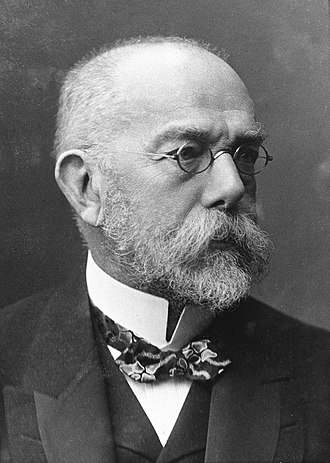Bacteriologist




Bacteriologist
A bacteriologist is a microbiologist who specializes in the study of bacteria, a large domain of prokaryotic microorganisms. Bacteriologists are involved in the identification, classification, and characterization of bacterial species. They play a crucial role in various fields including medicine, agriculture, biotechnology, and environmental science.
History[edit]
The field of bacteriology began in the late 19th century with the work of pioneering scientists such as Louis Pasteur and Robert Koch. These early bacteriologists developed techniques for isolating and identifying bacteria, which laid the foundation for modern microbiology.
Roles and Responsibilities[edit]
Bacteriologists perform a variety of tasks, including:
- Conducting laboratory experiments to study bacterial growth, metabolism, and genetics.
- Developing antibiotics and other treatments for bacterial infections.
- Investigating the role of bacteria in disease and immunity.
- Studying the beneficial uses of bacteria in processes such as fermentation and bioremediation.
- Teaching and conducting research in academic institutions.
Techniques and Tools[edit]
Bacteriologists use a range of techniques and tools, including:
- Microscopy for observing bacterial morphology.
- Culture media for growing bacterial colonies.
- Polymerase chain reaction (PCR) for amplifying bacterial DNA.
- Gel electrophoresis for analyzing bacterial proteins and nucleic acids.
- Biochemical tests for identifying bacterial species.
Applications[edit]
Bacteriologists contribute to various applications, such as:
- Developing vaccines to prevent bacterial infections.
- Improving agricultural practices by studying soil bacteria.
- Enhancing food safety through the detection of bacterial contaminants.
- Advancing biotechnology by engineering bacteria for industrial processes.
Notable Bacteriologists[edit]
- Louis Pasteur - Known for his discoveries in the principles of vaccination, microbial fermentation, and pasteurization.
- Robert Koch - Famous for his work on the germ theory of disease and the identification of the causative agents of tuberculosis, cholera, and anthrax.
See Also[edit]
References[edit]
<references group="" responsive="1"></references>
External Links[edit]
Ad. Transform your life with W8MD's Budget GLP-1 injections from $75


W8MD offers a medical weight loss program to lose weight in Philadelphia. Our physician-supervised medical weight loss provides:
- Weight loss injections in NYC (generic and brand names):
- Zepbound / Mounjaro, Wegovy / Ozempic, Saxenda
- Most insurances accepted or discounted self-pay rates. We will obtain insurance prior authorizations if needed.
- Generic GLP1 weight loss injections from $75 for the starting dose.
- Also offer prescription weight loss medications including Phentermine, Qsymia, Diethylpropion, Contrave etc.
NYC weight loss doctor appointmentsNYC weight loss doctor appointments
Start your NYC weight loss journey today at our NYC medical weight loss and Philadelphia medical weight loss clinics.
- Call 718-946-5500 to lose weight in NYC or for medical weight loss in Philadelphia 215-676-2334.
- Tags:NYC medical weight loss, Philadelphia lose weight Zepbound NYC, Budget GLP1 weight loss injections, Wegovy Philadelphia, Wegovy NYC, Philadelphia medical weight loss, Brookly weight loss and Wegovy NYC
|
WikiMD's Wellness Encyclopedia |
| Let Food Be Thy Medicine Medicine Thy Food - Hippocrates |
Medical Disclaimer: WikiMD is not a substitute for professional medical advice. The information on WikiMD is provided as an information resource only, may be incorrect, outdated or misleading, and is not to be used or relied on for any diagnostic or treatment purposes. Please consult your health care provider before making any healthcare decisions or for guidance about a specific medical condition. WikiMD expressly disclaims responsibility, and shall have no liability, for any damages, loss, injury, or liability whatsoever suffered as a result of your reliance on the information contained in this site. By visiting this site you agree to the foregoing terms and conditions, which may from time to time be changed or supplemented by WikiMD. If you do not agree to the foregoing terms and conditions, you should not enter or use this site. See full disclaimer.
Credits:Most images are courtesy of Wikimedia commons, and templates, categories Wikipedia, licensed under CC BY SA or similar.
Translate this page: - East Asian
中文,
日本,
한국어,
South Asian
हिन्दी,
தமிழ்,
తెలుగు,
Urdu,
ಕನ್ನಡ,
Southeast Asian
Indonesian,
Vietnamese,
Thai,
မြန်မာဘာသာ,
বাংলা
European
español,
Deutsch,
français,
Greek,
português do Brasil,
polski,
română,
русский,
Nederlands,
norsk,
svenska,
suomi,
Italian
Middle Eastern & African
عربى,
Turkish,
Persian,
Hebrew,
Afrikaans,
isiZulu,
Kiswahili,
Other
Bulgarian,
Hungarian,
Czech,
Swedish,
മലയാളം,
मराठी,
ਪੰਜਾਬੀ,
ગુજરાતી,
Portuguese,
Ukrainian
